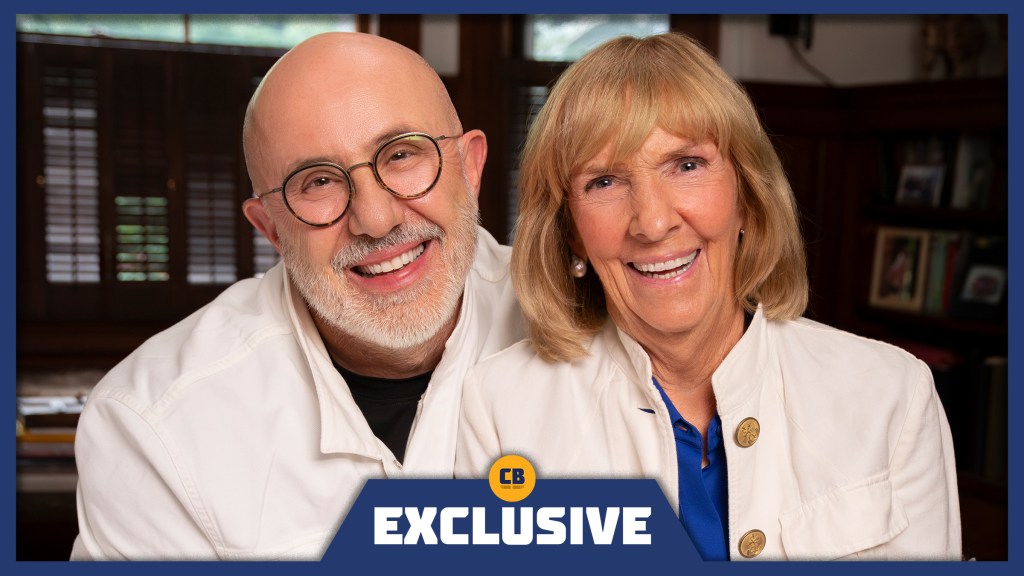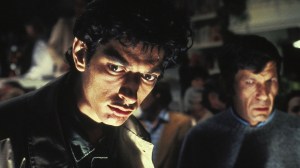The cast and crew of Jaws have chronicled the countless challenges the production faced in a variety of ways over the years, making the fact that it was a massive success feel all the more impressive. Despite how thoroughly the film has been documented, there are still perspectives to share on the experience, both from those directly involved in its creation and those who were immensely impacted by the film’s successes. In the new documentary Jaws @ 50, director Laurent Bouzereau sheds all-new light on the movie, while Wendy Benchley, wife of Jaws author Peter Benchley and ocean advocate, reflected on the film’s journey to the big screen and the impact of the “killer shark” on the misunderstood fish. Jaws @ 50: The Definitive Inside Story debuts on Nat Geo on July 10th during its annual SharkFest event.
Videos by ComicBook.com
Nat Geo describes the documentary, “This definitive account offers an unfiltered look at the chaos and creativity behind the making of Jaws, featuring never-before-seen footage from Spielberg’s and Benchley’s personal archives, including home videos and rare outtakes. Through candid new reflections, Spielberg recounts the high-stakes production, from battling a malfunctioning mechanical shark and relentless weather delays to his own post-production PTSD and fears the film would end his career. The documentary also reexamines the infamous ‘Jaws effect’ — the wave of shark fear it unleashed — and reframes it as a legacy of awe, curiosity, and enduring respect for the ocean’s top predator. Complemented by brand-new interviews with cast, crew, filmmakers, and shark advocates, Jaws @ 50 captures the full creative and cultural shockwaves of the first summer blockbuster.”
ComicBook caught up with Bouzereau and Benchley to talk about a new perspective on Jaws, its impact, and more.

ComicBook: Jaws has had an impact on people for 50 years. Do you remember the first time you were exposed to Jaws?
Laurent Bouzereau: I lived in France, it was called “The Teeth of the Sea,” Les Dents de la Mer, and it changed my life. I became obsessed with the notion of a director, I became obsessed with the notion of a score. From that day on, wanted to move to America, and not only meet those people, but be part of the entire aspect of American culture as depicted in Jaws. One could say that, without Jaws, I’d still be stuck in France and, I don’t know, selling baguettes. I owe Jaws a lot more than I realize, at times, but I’m very grateful, extremely grateful to Steven, who gave me a career in documentary filmmaking and in storytelling. And that was a direct effect of my passion for his own storytelling. So making this film, in a sense, brings me full circle. Whether it’s an ending or a new beginning, I have no idea, but I’m nonetheless grateful for it and don’t take it for granted.
You’ve been very closely associated with Jaws for decades now, but 50 years is definitely a milestone. When you were sitting down for these interviews, were there a lot of memories or anecdotes that you hadn’t even thought about in years?
Wendy Benchley: Well Laurent, of course, is a fabulous interviewer, so he got me remembering, yes. It was just a treat and wonderful and sentimental and fulsome to be able to sit and talk about 50 years of my life and, most of them with Peter, and the last 10 or 12 years with Jon Jeppson, my husband now. So, lucky me, and lucky that Laurent — he had followed Peter and me over the years and then he came to me a year and a half ago and said, “I want to do a completely different documentary,” so I was blessed that he took it in hand.
Going along with the legacy of this movie and the book, there have been various chronicles of the making of the movie, behind-the-scenes books, and documentaries. When it came to approaching Jaws @ 50, what was your perspective on how to make sure you were going to tell a side of this journey that hadn’t really been explored before?
Bouzereau: It was a little bit nerve-racking, in the sense, “Do we really need another documentary on Jaws? Let’s let the movie live and let live and not necessarily re-tell that story,” but the thing that’s never been told before, I feel, was the human angle.
Turning 50 is a big deal, it was a big deal for me, because you ask yourself, “Am I relevant? Am I still connecting to a new generation?” And in the case of Jaws, I was asking that question, and the answer was pretty much obvious. But I think, at 50, it’s a very important milestone that had to be somewhat discussed, but I approached it in a very different way than my other doc 30 years ago on Jaws, which was much more about the mechanical aspect of the film and making it, as opposed to the heart and soul of a filmmaker, Steven Spielberg, really encountering this incredible challenge at a very young age, at a very young time in his career, and having to overcome it. My film is actually a drama and suspense movie and a survival story. I don’t think it’s been told in that way before, even if you are showing the same images, even if you are showing the same photos, suddenly you have a perspective that’s 50 years old. That’s a huge thing in any human life, let alone in a work of art. You look at films that were released the same year that no one knows about.
I’ll tell you an interesting thing that’s a little aside from your question, but there was a moment where I was like, “Oh, we need to mention the director who didn’t get [the job], who was Dick Richard. We have to mention all the actors who were approached and didn’t get the part or didn’t want the part,” and I’m like, “No, because young people do not know who those people are,” so if you say, “Sterling Hayden didn’t want to play Quint,” to a young person, it’s like, “Who is Sterling Hayden?” So, therefore, I had to adjust my approach to this film as something that was for someone who knew nothing about filmmaking and that, in a way, elevated it by reduction, actually, to a very human, relatable story of courage and perseverance.
There’s the negative impact that Jaws has had on sharks in popular culture and then you, Peter, Jon, plenty of other people have spent your lives working to correct that public image, so looking back on the past 50 years, do you think Jaws had a net positive impact for sharks or are you still working to correct that persona?
Benchley: I definitely know it’s a net positive. Jaws has kept sharks in the public eye. There are fans all over the world of sharks because of Jaws. I always mention the statistic that, at the Rosenstiel school, there was a 30% increase in applications for marine science right after Jaws. It didn’t take 40 years, it happened right after Jaws and I know that, at other institutions, there was a huge increase also. So yes, some people took Jaws as a license to kill sharks, but remember, it was fiction. But the majority of people, even though they were a little bit afraid, they were fascinated and riveted and wanted to learn more.
I was always impressed, revisiting Jaws, how Hooper says, “All this machine does is swim and eat and make little sharks,” just how accurate that is, that it’s all these sharks want.
Benchley: Well, they’re an animal, just like us. You’re born, you eat, you propogate, and you die.
I’m sure you felt like you had heard it all about Jaws before entering the project, but what is something you learned about the movie that you had never heard before?
Bouzereau: Each time I talk to Mr. Spielberg, sit across from him, or chat with him under any circumstances, I learn something. There’s always his generosity of spirit and humanity that is just part of who he is and I’ve been very privileged to be included in some of those discussions that are illuminating. I had no doubt that I was gonna learn something. I think the stories of him and his struggles, particularly the story of being at a party on the island in the middle of production and some famous actor whose name I don’t know, but nonetheless, said, “You’re career is over.”
And, for that person, an actor who would need to impress a director to get work, didn’t care to hurt somebody’s feelings, it’s pretty much an indication that everybody was convinced his career was over. He was very successful very young and this is a lesson in Hollywood. They can’t wait to bring you up and they can’t wait to bring you down. He was making headlines, even though this was the world pre-social media, so it was not as widespread, but it was, at least in the case of the industry. So the whole aspect of that, and also the consequence of it being PTSD, even after the movie was successful, was a revelation for me. Again, all the times I’ve talked about Jaws with him, “Oh, my God, the shark wasn’t working, ha ha ha,” and, “Yes, oh, my God, the shark wasn’t working, my career is over,” it’s a very different perspective.
Whether it be your work in conservation or teaching people about Jaws, with this documentary, what do you hope is the biggest takeaway that audiences have after watching Jaws @ 50?
Benchley: I think the takeaway is that sharks are fascinating and I hope that people will definitely get the message that we need our sharks to keep a healthy ocean. Very, very important. I honestly can’t remember I got this into the documentary, but 90% of the sharks in the ocean have been killed over the years. So we only have 10% of the sharks left in the ocean, so it’s absolutely vital that they are allowed to propogate and to make new sharks and keep the ocean healthy.
There were plenty of people directly involved in Jaws to chat with, you knew you were going to go to them, but as far as people outside of the actual production, like Jordan Peele, Steven Soderbergh, Emily Blunt, how did you determine who you wanted to talk to?
Bouzereau: I was casting this very carefully in collaboration with Steven, Amblin, my producers, and Nat Geo, and that included, also, the scientists I wanted to talk to, that whole world. I wanted each of those people to bring a completely different sensibility to the Jaws factor. Jordan Peele, someone who’s been in front of the camera and behind the camera, who is making movies, and as a kid, is wearing a Jaws t-shirt. To me, that was very significant, so what’s his story with Jaws? Emily Blunt, looking through Instagram, I saw that she was on the red carpet saying she was obsessed with Jaws, well, what does that mean? And she gave me the most inspiring interview, from her point of view, which I thought was incredible. Janet Maslin, who was a critic at the time. Of course, Steven Soderbergh, well-known for making movies on very low budgets, sometimes very fast, is obsessed with the call sheets and how long the production schedule was. I could see him getting extremely emotional because he puts himself in that position. Guillermo is obsessed with the monsters, the monsters inside us, the monsters outside us, so, of course, Jaws is going to be his monster, a monster that’s gonna influence his filmmaking. Jim Cameron is very much someone who works, is all about water. Titanic, The Abyss, the Avatar films, and also an ocean activist. He was presenting a different perspective, and so on.
I was really — all those voices were very carefully chosen and I wish I was making the Lawrence of Arabia of Jaws, because there was so much more to talk about, but I was very determined to have a very straight throughline, 90 minutes, and be very compact, because this needed to be entertaining. And the only way you can be entertaining is by being very structured, so it was my editors, we had cards on the wall, it’s almost like a very creative albeit very scientific approach to it all.
I hadn’t read Jaws until I had seen the movie plenty of times. There were changes, like the affair between Hooper and Brody’s wife and the organized crime, mob ties of mayor Vaughn. What were Peter’s reactions to the changes that were made from the source material to the movie?
Benchley: That was absolutely fine with him because he realized, in a novel, you need to have more complexity as people read, but when you have a movie, you need a straight A-B-C-D plotline. He was a sophisticated guy, so he knew that.
The one thing he did really work hard on was trying to get Steven to make the shark a little bit smaller, because a really big great white shark that exists in the real world is 15 feet, not 25 feet. But Steven is so talented and brilliant and he knew he needed to have a bigger shark to make that movie grab you and really make you afraid.
Along those lines, what were Peter’s thoughts on the follow-up movies and what were your thoughts on things like Jaws: The Revenge?
Benchley: May I tell you that we never saw any of them? We didn’t have much to do with them. Because, really, Peter was a novelist and he went on to write other books and we went on to do expeditions and to work hard on our ocean, environmental issues, so we were not part of any of the other movies.
Peter had so many other books that were thrilling and entertaining and felt like direct reactions to Jaws, in how the characters are advocating for sharks. Is there another one of Peter’s novels that you think deserves to be revived for a new generation and turned into a new movie or miniseries?
Benchley: Oh yes, you hit a chord close to my heart, and that is we’re just hoping someday, someone will make The Girl of the Sea of Cortez, because that was Peter’s favorite book and I don’t think we have time for me to go into the story, but it is an absolutely beautiful book about a relationship of a young woman from Mexico and her relationship to a manta ray. And, actually, Laurent Bouzereau is working on selling that and getting it made, so maybe your interview will help us.
Jaws @ 50: The Definitive Inside Story debuts on Nat Geo on July 10th during its annual SharkFest event.
This interview has been edited for length and clarity. You can contact Patrick Cavanaugh directly on Twitter or Instagram.








